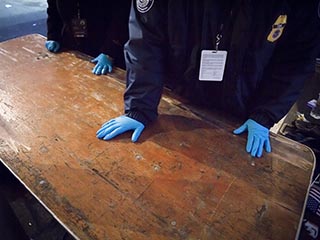You’ve just enjoyed a great vacation in Europe and are now on your way home. After suffering the hassles of long lines and security at the airport and a cramped flight in coach, you arrive back at Newark Airport. You patiently wait in line for the Customs and Border Entry check and sail through after casually chatting about your trip with the officer who stamps your United States passport and welcomes you back home. While waiting at the luggage carousel and hoping that your luggage hasn’t been lost, you’re approached by a Customs and Border Protection officer (“CBP”) and asked to come with him to another room. In that room, CBP officers ask you about your travels – why you were there, how long you were gone, who did you meet and what did you do. You explain that it was a simple, straightforward holiday trip that you had saved up for over the past year. The officers then ask for your cellphone, iPad and computer. You ask why and they say that it is routine. They examine the devices and find that they are all password protected. They ask you to unlock your devices so that they can examine the contents. You are shocked, you are a U.S. citizen with constitutional rights to privacy. Doesn’t the Fourth Amendment protect you from unreasonable searches and seizures, and require the officers to have a warrant supported by probable cause? Usually it does, but not at the border. When you re-enter the United States, you enjoy significantly fewer protections against searches and seizures.
Recently we have all read about non-citizens being stopped, detained and searched at the border – be it an airport or crossing into the United States from Canada or Mexico – what is less known is that the same intrusive questioning and searches can happen to citizens. According to the most recent statistics, these types of searches have greatly increased, from 8,500 in 2015 to over 24,000 in 2016.
So, what if you refuse to provide the passwords? Well, you can be detained and your devices can be seized. Faced with that, most citizens simply provide the passwords and begrudgingly let the officers scroll through their devices. But, in the age where even our smart phones contain so much of our lives – personal photos, texts and emails with our loved ones, private and confidential business dealings and the like – it is an enormous invasion of privacy that should require a judge’s determination that probable cause exists to compel the disclosure of the password and the search. Our constitutional rights should not stop at the airport or the border.
Several notable organizations and members of Congress agree and are sponsoring legislation that would require a judicial determination of probable cause before CBP would be allowed to search electronic devices. As expected, however, these proposals have been met with opposition citing the country’s need to protect itself from terrorists and other threats. These competing interests must be balanced and reasonable solutions advanced.
If you or your family members have been detained and your electronic devices seized, the attorneys at Stahl Gasiorowski Criminal Defense can help. Stahl Gasiorowski Criminal Defense Lawyers aggressively defend organizations and individuals charged with complex federal and state crimes. Founder Robert G. Stahl is recognized as one of the top criminal defense attorneys in the NY/NJ area for his skills, knowledge and success.
To contact us to discuss your case, call 908.301.9001 for our NJ office and 212.755.3300 for our NYC office, or email us at rgs@sgdefenselaw.com.




Leave A Comment